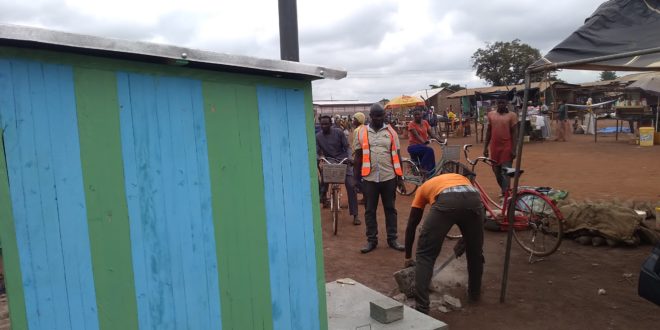Youth in the East Gonja Municipality of the Savannah Region have been urged to take advantage of the sanitation market under the Community led Total Sanitation model to create jobs for themselves.
This according to the Municipal Sanitation officer James Achana will reduce the increasing rate of unemployment in the area.
He made these remarks at the maiden sanitation business expo organized by the business advisory unit of the assembly in Salaga.
The community led total sanitation model was introduced in 2016 to help various assemblies create awareness on various sanitation facilities aimed at tackling the menace of Open Defecation in communities.
It is estimated that only 21% of Ghanaians have access to basic sanitation while 22% defecate in the open. In 2016, the East Gonja Municipality recorded only 2% access to basic sanitation.
The figures increased to 26% in 2017 with Open Defecation Free of 7%.
Currently, the figure stands at 30%.
Out of a total of 293 communities in the Municipality, 110 of them have been declared Open Defecation Free communities.
In 2017, the Municipality placed 7th on the regional sanitation league table but dropped to 17th position in 2018 and maintained same in 2019.
The Municipality in other to improve upon its sanitation practices trained artisans on various ways of constructing household latrines.
Goal 6 of the United Nations Sustainable Development Goals is aimed at ensuring availability and sustainable water and sanitation for all.
Mr. James Achana at a programme to create awareness of people on the various ways of constructing household latrines in Salaga called on the youth to capitalize on the sanitation expo opportunities to embrace and invest in the sanitation business.
He said the sanitation market is a good employment avenue for the youth.
“Majority of the youth in Salaga complain there are no jobs for them to do. It is sometimes sickening to hear that because sanitation management alone is a full time job for them to venture into”
He also called on the general public to desist from open defecation.
“It doesn’t cost much to own a toilet in your house because there are a lot of them you can choose from which will be affordable for you” he stressed.
He urged the people to take advantage of credit facilities to construct their own toilets.
One of the artisans Iddrisu Abdulai said constructing a toilet can range from 700 cedis to 2,200 cedis depending on the type of toilet you want.
Source: Thepressradio.com/Christopher Amoako
 Home Of Ghana News Ghana News, Entertainment And More
Home Of Ghana News Ghana News, Entertainment And More





